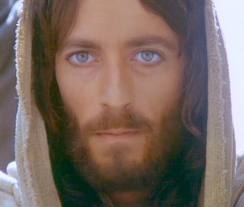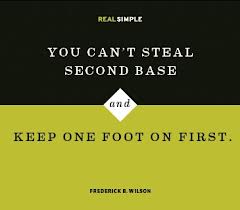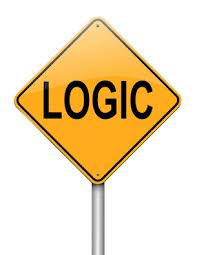Nov 26 2014
So is Reality a Café or a Baseball Diamond? Part 1
Attention, all you sports fans! In the interest of reaching out to all of you who already adhere to our country’s most popular (and most zealously practiced) organized religion (professional sports), allow me to pitch you the following proposal: that this website’s analogy to a café be supplemented (though not supplanted) by a second metaphor: that of a baseball diamond. (And since we serve pancakes here at Reality Café, the cry “Batter up!” can serve double duty.)
Permit me to elaborate.
 Everyone knows that the ultimate goal of every baseball player when it’s his or her turn at bat is to make it all the way home. To do that, he/she needs to bring a bat up to home plate, to assume the proper stance in the proper place (the “batter’s box”), to see the ball coming, to swing at it successfully enough to connect with it and send it flying forward within the foul lines, and then to make the rounds of the bases, from first to second to third and then home, without a) hitting a pop fly that’s caught, or b) being tagged “out” as he or she is running the bases, or c) having the inning end while he/she is still stuck on first, second, or third base.
Everyone knows that the ultimate goal of every baseball player when it’s his or her turn at bat is to make it all the way home. To do that, he/she needs to bring a bat up to home plate, to assume the proper stance in the proper place (the “batter’s box”), to see the ball coming, to swing at it successfully enough to connect with it and send it flying forward within the foul lines, and then to make the rounds of the bases, from first to second to third and then home, without a) hitting a pop fly that’s caught, or b) being tagged “out” as he or she is running the bases, or c) having the inning end while he/she is still stuck on first, second, or third base.
I believe that the path to perceiving religious reality is a lot like that.
In an earlier, more epistemologically* innocent age, books of Christian apologetics** generally began with getting you to “first base” by making the case for the existence of God (the case for theism). Nowadays, unfortunately, in our presumably “postmodern” era, such an approach is considered philosophically naive. Why? Because many today assert that human reason is too hopelessly subjective to make sense of such a question (i.e., “Does God actually exist?”). Or they assert that there is no such thing as objective reality — either God or anything else — outside each person’s mind.
 (* Epistemology is the branch of thought that deals with how we can know things to be true, or whether such knowledge is even possible. ** Apologetics is the branch of religious thought which deals with demonstrating and defending the truth of a particular religion, and answering the various objections raised against that religion’s claims.)
(* Epistemology is the branch of thought that deals with how we can know things to be true, or whether such knowledge is even possible. ** Apologetics is the branch of religious thought which deals with demonstrating and defending the truth of a particular religion, and answering the various objections raised against that religion’s claims.)
Therefore, before one can even get to first base, spiritually speaking (that is, to a defensible belief in God), some prolegomenary (preliminary) matters must first be established — exactly as in baseball. In baseball, one does not simply begin running towards first base. You only qualify for that action by first bringing a bat up to home plate, taking the proper stance in proximity to the plate (standing in the “batter’s box”), by seeing the ball, by successfully swinging, and by hitting a “fair” ball. No one would bother holding or hefting a bat that he didn’t believe existed, or didn’t believe could actually hit the ball. And no one would swing at a ball that he didn’t believe existed, or didn’t believe could actually traverse the space between the pitcher’s hand and home plate.
 So too in the spiritual realm. The first task of apologetics can no longer be to establish the existence of God. That’s starting with the player already running to first base. The logically prior task is first to establish the existence of objective truth (represented in this metaphor by the baseball). The second task is to establish the existence and general reliability of human rationality (represented by the bat). The third task is to learn to take the proper stance, in this case, one of intellectual honesty and spiritual openness. And the fourth task is to establish the fact that reason can actually perceive the truth and connect with it, make contact with it, as the bat does with the baseball.
So too in the spiritual realm. The first task of apologetics can no longer be to establish the existence of God. That’s starting with the player already running to first base. The logically prior task is first to establish the existence of objective truth (represented in this metaphor by the baseball). The second task is to establish the existence and general reliability of human rationality (represented by the bat). The third task is to learn to take the proper stance, in this case, one of intellectual honesty and spiritual openness. And the fourth task is to establish the fact that reason can actually perceive the truth and connect with it, make contact with it, as the bat does with the baseball.
Only when one believes in 1) the ball (objective truth) and 2) the bat (reason as the divinely-provided instrument for connecting with the truth), and 3) the fact that the ball and the bat go together — are in fact the proverbial “match made in heaven” — will one swing for the bleachers, or at least bunt. (I mean, of course, use one’s mind to entertain a rational argument for the existence of God).
 Only after those preliminary arguments about the nature of truth and the competence of reason have been successfully made can a person be in a position to then make a run for first base — to believe in a God who really, absolutely, objectively exists.
Only after those preliminary arguments about the nature of truth and the competence of reason have been successfully made can a person be in a position to then make a run for first base — to believe in a God who really, absolutely, objectively exists.
Now, I personally yearn — achingly, desperately yearn — for true, deep, and complete unity among all human beings. Probably you do, too. And I hope, in the course of our conversations, to demonstrate to your satisfaction that no one desires such unity among all the members of the human race more than does God Himself.
But here we encounter the first of several sad divisions among human beings (sad, but surmountable, so don’t despair). For many have made it to first base (i.e., have come to believe in God) while many still have not — or at least not yet. These others are still back in the batter’s box, striking out, or not even swinging, perhaps even blind to the ball whizzing by them. The distinction, and division, between theists — believers in God (from the Greek word for God, theos) — and non-theists is a sad one … sad but unavoidable in a world where some make it to first base while others do not.
And even for those who’ve intellectually made it to first base the game isn’t over. For while getting to first base is necessary, it’s not sufficient. (The concept of something being “necessary but not sufficient” will be an oft-recurring refrain through this website’s little essays and discussions.)
 Here’s why: if one were to poll the people all excitedly chattering on first base and congratulating themselves on their good fortune in having made it there, we might be surprised to discover that they represent more than one religion, and that each of these different religions claims to be the true theism (the true belief in the one true God). There is, for example, Judaism. There is also Islam. And there is Christianity (to name but the three most well-known varieties of theism).
Here’s why: if one were to poll the people all excitedly chattering on first base and congratulating themselves on their good fortune in having made it there, we might be surprised to discover that they represent more than one religion, and that each of these different religions claims to be the true theism (the true belief in the one true God). There is, for example, Judaism. There is also Islam. And there is Christianity (to name but the three most well-known varieties of theism).
 Christian apologists, therefore, realize that the apologetic task isn’t finished when one has gotten people to first base by successfully making the case for theism. One must proceed to then make the case for Christianity as the correct theism. This of course means making the case for Christ as the true, unique, and definitive incarnation and revelation of God to humankind.
Christian apologists, therefore, realize that the apologetic task isn’t finished when one has gotten people to first base by successfully making the case for theism. One must proceed to then make the case for Christianity as the correct theism. This of course means making the case for Christ as the true, unique, and definitive incarnation and revelation of God to humankind.
Those who are persuaded by that case will then make the run from first base to second base — from “mere theism” to “Christian theism.” In so doing, of course, they will not be leaving theism behind: they will be advancing to what Christians believe to be “theism come into its own” — to what is in fact the only authentic, coherent, fully-formed theism (for reasons I’ll explain when we get to that point). But they will necessarily be leaving behind those who don’t follow them in that particular leg of their intellectual and spiritual journey, and thus a second sad division ensues: between theists who are Christians and theists who are non-Christians.
Should one avoid creating this division by simply staying on first base and settling for a nice generic theism upon which all theists can agree?
 No, because staying on first base doesn’t really solve anything. The fact is that Christianity on the one hand, and Judaism and Islam (and any other non-Christian theistic religions one might wish to include) on the other hand, make competing and conflicting claims about Jesus Christ — claims that each person must ultimately accept or reject. (Jesus Christ himself doesn’t allow “sitting on the fence” as a third option; see Matthew 12:30.) Christianity astoundingly claims that Jesus Christ is none other than Almighty God in the flesh, and that He is thus the one and only Savior through whom liberation from sin and a completely authentic life can be achieved (John 14:6; Acts 4:12; 1 John 5:11-12).
No, because staying on first base doesn’t really solve anything. The fact is that Christianity on the one hand, and Judaism and Islam (and any other non-Christian theistic religions one might wish to include) on the other hand, make competing and conflicting claims about Jesus Christ — claims that each person must ultimately accept or reject. (Jesus Christ himself doesn’t allow “sitting on the fence” as a third option; see Matthew 12:30.) Christianity astoundingly claims that Jesus Christ is none other than Almighty God in the flesh, and that He is thus the one and only Savior through whom liberation from sin and a completely authentic life can be achieved (John 14:6; Acts 4:12; 1 John 5:11-12).
Whether we’re Christian or non-Christian, let’s be honest: that’s a staggeringly absolute, audacious, and exclusive claim, regardless of whether or not we think it’s true. But if it is true, then one has no choice but to move forward from first to second base. In doing so, as I’ve already stated, one is not leaving theism behind: one is running toward the only authentic theism, and leaving behind inauthentic theisms that don’t, ultimately, deliver the goods (i.e., God Himself: the Supreme Good).
 And if the run toward second base is indeed a run toward more Truth, then one might well expect all sorts of negative forces to be arrayed against you to keep you from making it to second base — forces that Christianity identifies as “the world, the flesh, and the devil.”
And if the run toward second base is indeed a run toward more Truth, then one might well expect all sorts of negative forces to be arrayed against you to keep you from making it to second base — forces that Christianity identifies as “the world, the flesh, and the devil.”
By “the world” is meant society configured in a stance of opposition to Christ. By “the flesh” is meant our own fallen human nature, which left to itself will always choose the path of least resistance, rather than swim upstream. And by “the devil” is meant that brilliant fallen angel, that prince of darkness and hater of light who will deploy every error imaginable in order to keep us from discovering and embracing the truth.
So getting to second base won’t be easy. These forces will do their utmost to trip us up and tag us out. We’re going to have to “steal” second base. That’s one of the interpretations of Jesus’ words to the effect that “the kingdom of heaven suffers violence, and [only] the violent [the forceful, the energetic] bear it away [or, are taking it by force]” (Mt 11:12). And that’s going to mean leaving behind the current political correctness of pretending that we can all camp out permanently on the first base of an undifferentiated theism.
(This essay is continued in the next post, “Making It Home: Café or Baseball Diamond, Part 2.”)




